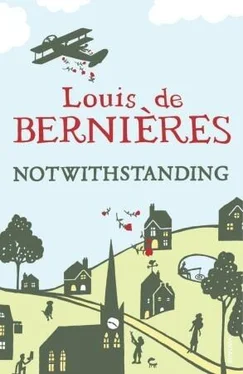Louis de Bernieres - Notwithstanding - Stories from an English Village
Здесь есть возможность читать онлайн «Louis de Bernieres - Notwithstanding - Stories from an English Village» весь текст электронной книги совершенно бесплатно (целиком полную версию без сокращений). В некоторых случаях можно слушать аудио, скачать через торрент в формате fb2 и присутствует краткое содержание. Год выпуска: 2010, Издательство: Vintage, Жанр: Современная проза, на английском языке. Описание произведения, (предисловие) а так же отзывы посетителей доступны на портале библиотеки ЛибКат.
- Название:Notwithstanding: Stories from an English Village
- Автор:
- Издательство:Vintage
- Жанр:
- Год:2010
- ISBN:нет данных
- Рейтинг книги:4 / 5. Голосов: 1
-
Избранное:Добавить в избранное
- Отзывы:
-
Ваша оценка:
- 80
- 1
- 2
- 3
- 4
- 5
Notwithstanding: Stories from an English Village: краткое содержание, описание и аннотация
Предлагаем к чтению аннотацию, описание, краткое содержание или предисловие (зависит от того, что написал сам автор книги «Notwithstanding: Stories from an English Village»). Если вы не нашли необходимую информацию о книге — напишите в комментариях, мы постараемся отыскать её.
is a funny and moving depiction of a charming vanished England.
Notwithstanding: Stories from an English Village — читать онлайн бесплатно полную книгу (весь текст) целиком
Ниже представлен текст книги, разбитый по страницам. Система сохранения места последней прочитанной страницы, позволяет с удобством читать онлайн бесплатно книгу «Notwithstanding: Stories from an English Village», без необходимости каждый раз заново искать на чём Вы остановились. Поставьте закладку, и сможете в любой момент перейти на страницу, на которой закончили чтение.
Интервал:
Закладка:
Agatha plonks herself down on the second step of the stair. She feels disappointed, and a little sick from all the rushing and hoping. She thinks that, since she’s got her teeth in, she might as well phone someone herself. She tries to invent pretexts that she hasn’t used before, and then she rings Joan. ‘Oh hello, Joan,’ she says, her voice full of cheeriness, ‘awfully nice to see you this morning. I just wanted to tell you that I saw some awfully cheap spades in Scats, and I thought, “I must tell Joan.” Didn’t Peter break yours? If I remember rightly … Oh, you got another one … well, never mind. Why don’t you pop round later and we’ll have tea? I’ve got some lovely digestives. It would be awfully nice.’
In the house next door, Joan’s heart sinks into her shoes. She is making fudge for the Women’s Institute, she is trying to listen to a soap opera on the radio, and she remembers all too vividly that Agatha’s tea tastes of tomcat’s water. She is sweating and uncomfortable, unsure whether or not it’s because of the menopause or because of the effort of stirring the huge saucepan of boiling goo. ‘Oh Aggy,’ she says, ‘you must come round here, I’m sure it’s my turn. About five o’clock?’ Joan is fond of Agatha, and even secretly admires her magnificent disregard for housework. Joan suspects that if she were to be widowed and live to a solitary old age, then she would end up just like Agatha too. Joan thinks it remarkable that Agatha’s abundant halo of snowy hair is usually immaculate.
Agatha is thrilled to be popping next door later, and it is with renewed verve that she fetches two chairs from the kitchen and uses them to help her saw the log. Her new blade cuts sweetly, and she ensures that the sawdust falls on to newspaper so that she can use it as litter for the hamster. Waste not, want not. Thinking of the hamster inspires her to fetch it from its cage and let it run around her body, up one arm, across the backs of her shoulders and down the other arm. She puts it in the pocket of her cardigan and it falls asleep. Agatha fetches a deckchair and decides to have a doze in the garden, so that she will be feeling as fresh as possible at teatime.
She catches the delicious pre-war smell of Joan’s roses wafting in from the garden next door, and is lulled by the rattle and whine of a lawnmower in the middle distance. Her jackdaw flops out of the drawing-room window, and waddles portentously out into the middle of the lawn. It croaks from time to time, talking to itself about nothing in particular, peering between the blades of grass in the hope of interesting snacks, and then it menaces one of the cats, who regards it with aristocratic disdain and coolly parades away into the rhododendrons. A huge heron flaps slowly overhead, its belly laden with expensive goldfish from the big new pond constructed by the nouveau riche couple who moved in recently because it was so convenient for London. A light aircraft crosses the sun, casting a fleeting shadow upon Agatha and her house, and she is suddenly reminded of when the beautiful young men used to do victory rolls directly above, not a hundred feet in the air, teasing the tips of the oaks, and she could see them clearly in their cockpits, with their white silk scarves, and goggles, and leather headgear. She used to jump up and down, and wave, and they would smile and wave with one hand as their wondrous and romantic machines swept them back to Dunsfold aerodrome after another successful defence of country and king, the exhaust at the sides of their engine nacelles spitting bravado and orange flame. And that was how she got to know some of the handsome airmen, because they all turned up one summer evening in a three-tonner, and, with the aid of a ukelele, serenaded her from the gate, and then vaulted over it and invited themselves to tea, saying that they simply couldn’t resist coming to visit the beautiful girl who always waved to them when they were flying home from seeing off the Hun. One day, on her birthday, two of them flew overhead in a Gypsy Moth and dropped roses and then landed in the field behind, so that the cows panicked, and they came in and invited her to a dance at the mess. Agatha smiles in her sleep, remembering that she spent three days bullying the Rector’s daughter into teaching her how to waltz.
Agatha goes to tea with Joan at five o’clock precisely and Joan notices that there is a little piece of bramble in Agatha’s hair, but she doesn’t say anything. They talk about how the village isn’t what it was. There’s no one to run the village shop, and weekenders and commuters are snapping up the houses so that local people, born and bred, can’t afford to live in their own community. The girls’ cricket team is up to full complement, but the men’s is two players short, and Agatha says that she’d play in it herself if she were younger. ‘I used to bowl an awfully good googly.
‘Did you know that Polly Wantage used to play for England?’
‘Gracious,’ says Joan, ‘did she?’ Joan is surprised that one can live in a village for so many years, and yet know others so slenderly.
‘She was quite the spin bowler,’ says Agatha. ‘Wonderful leg break.’
Joan tries to imagine Polly playing cricket but she sees Polly only as she is now, apparelled like a man, in plus fours, hairy tweed jacket and deerstalker hat, prowling the woods in unrelenting pursuit of squirrels. The children say that she eats them, but this has never been proved. Polly lives in a large house in the woods at the end of a muddy track that is almost impassable in winter. She shares it with her lifelong companion, a secretive woman who wears fine dresses and lorgnettes and is rumoured to be an artist, but hardly anyone has ever seen her. Everybody suspects that Polly and her companion might be more than friends, but nobody has said so openly. Polly once scored a century against Australia. She is the kind of character who belongs to this soil and these people, in the same manner that the bracken belongs on Busses Common, and it is unwarranted for others to pry into details.
Agatha goes home and calls her menagerie. ‘Chuffy chuffy chuffy chuffy!’ She arranges the bowls about the floor, on top of the newspaper, and decides that she will spend the evening knitting another grey cardigan. Agatha is not fat, but she has pendulous breasts and can’t be bothered with brassieres. She knits vast and shapeless grey cardigans that she mistakenly thinks will disguise their fascinating motion, and she wears each one until it disintegrates. She sits in her armchair in the living room, with the windows open so that she can hear the linnets sing, and her needles click together. ‘Shoo shoo,’ she says to the cats who come to tug at her wool.
Outside in the Hurst, Polly Wantage is shooting squirrels. The twelve-bore cracks, the dogs of the village are set to barking, and Agatha hears the little pellets pattering down through the leaves like the first drops of rain. Agatha deprecates this slaughter of innocent creatures, and she tuts about it to herself, but she pardons it because she thinks that Polly Wantage must be slightly dotty.
At eight o’clock Agatha decides to have supper, and goes to make a pot of tea. She arranges four digestive biscuits on a plate, which she will eat slowly in order to make them last.
She feels a sharp ache in her left arm, and then a blow from a sledgehammer seems to strike her from within. She gasps and falls to her knees. She has never known such bone-breaking pain in her whole life, and she is bewildered, breathless and astonished. She puts her hands to the floor and crawls a little way, but then lets herself collapse slowly sideways among the animals’ dishes. She smells newsprint, mud, Kitekat and Chappie, and closes her eyes in agony and resignation.
Peace descends upon her like a mother’s hand, and she has the feeling that she is flying away over the fields. Below is the stumpy tower of St Peter’s Church on the hill, and, twenty miles away, the sparkling angel on the summit of Guildford Cathedral flashes a scintilla of golden light. She is higher than the rooks, and finds herself in a vast and empty space. She looks about expectantly, thinking that someone is coming to meet her, but there is no one at all. Not even her father, who spent his life behind a newspaper and a pall of pipe smoke, nor even her mother, who lived her life as if it were a penance.
Читать дальшеИнтервал:
Закладка:
Похожие книги на «Notwithstanding: Stories from an English Village»
Представляем Вашему вниманию похожие книги на «Notwithstanding: Stories from an English Village» списком для выбора. Мы отобрали схожую по названию и смыслу литературу в надежде предоставить читателям больше вариантов отыскать новые, интересные, ещё непрочитанные произведения.
Обсуждение, отзывы о книге «Notwithstanding: Stories from an English Village» и просто собственные мнения читателей. Оставьте ваши комментарии, напишите, что Вы думаете о произведении, его смысле или главных героях. Укажите что конкретно понравилось, а что нет, и почему Вы так считаете.












